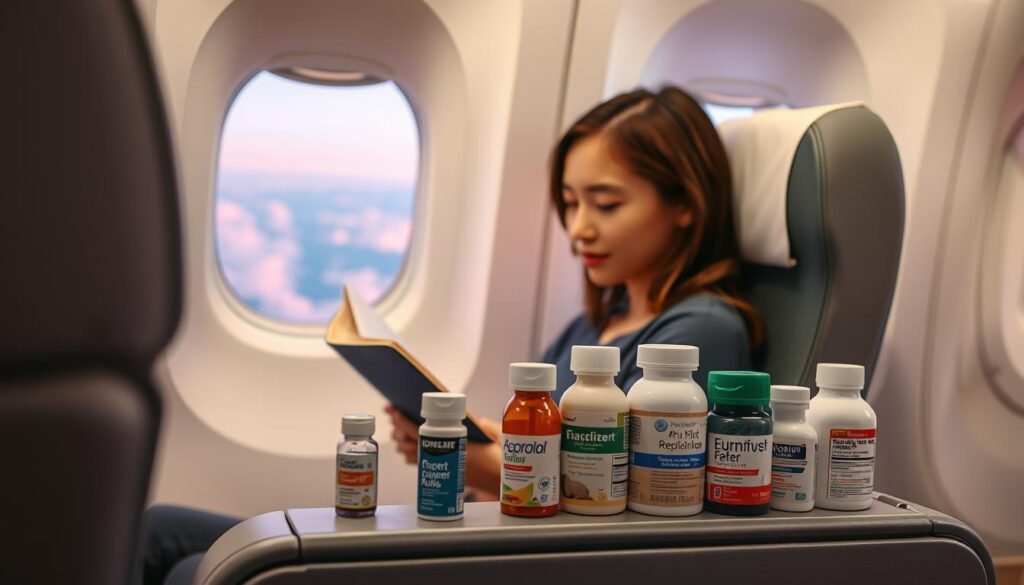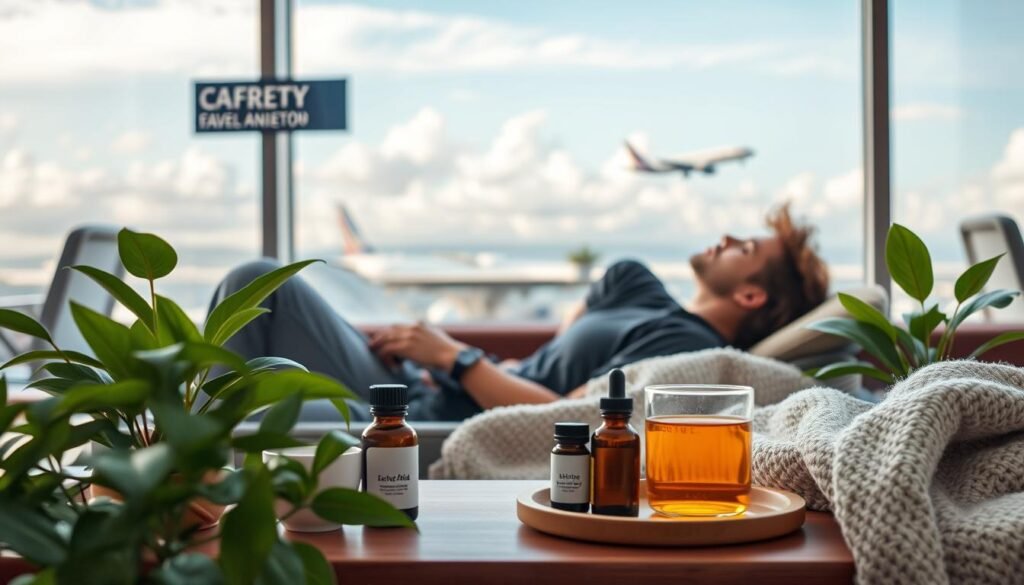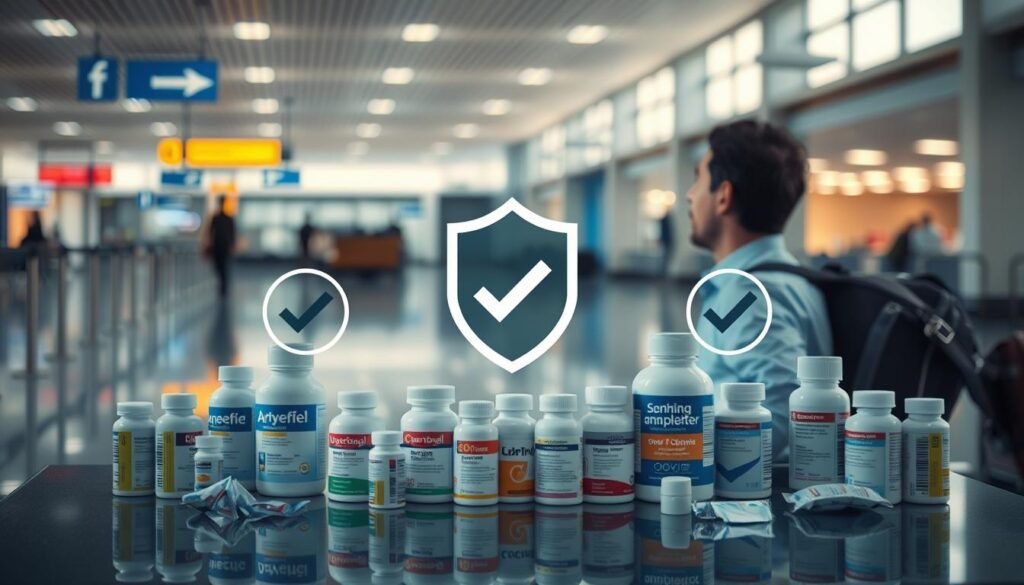About 25% of adults feel scared of flying, known as aviophobia. This fear makes getting on a plane stressful. People dealing with this often face symptoms like a racing heart, sweating, and feeling dizzy. These can lead to panic attacks mid-flight. Luckily, there are over-the-counter (OTC) medicines that help. This article looks into OTC options for calming flight fears, talking about how they work, if they’re safe, and if they’re a good choice for air travel worries.
Key Takeaways
- Flight anxiety affects a significant portion of adults, necessitating effective treatment options.
- OTC medications offer a practical approach to managing both physical and psychological symptoms associated with flight anxiety.
- Natural supplements like lavender and chamomile may provide additional non-prescription flight anxiety relief.
- Understanding the effectiveness and limitations of these medications can guide individuals towards the best OTC medication for fear of flying.
- Consulting healthcare professionals is crucial for those with persistent anxiety symptoms.
Understanding Flight Anxiety
Flight anxiety, or aviophobia, affects a lot of people. About 40% feel some fear when flying. For some, this fear turns into a severe phobia, affecting 6.5% of individuals. Knowing why people fear flying helps in supporting them better.
Many feel trapped in tight spaces, especially in planes filled with passengers. Signs of flight anxiety include sweating for 60% of anxious people, and 80% have a faster heart rate. Scary events in air travel news can also make 60% of once confident fliers more scared.
Getting older might make flying scarier for one in five adults. But learning about plane safety helps reduce fear. Around 70% who learn about it feel less scared. This shows that knowing more can help lessen the fear.
Using music therapy and deep breathing can help calm you down. These can slow your heart rate by 10-15 beats per minute. Gradually getting used to airports can lower anxiety by 40% for many.
The Psychology Behind Flight Anxiety
Fear of flying, also known as aviophobia, involves emotions and thoughts that make flying scary for some people. Some have had scary experiences, like intense turbulence or emergencies. These events make the fear of flying grow stronger, causing a lot of stress when flying.
Seeing news about plane accidents can make the fear worse. This can happen even if the person hasn’t had a bad experience themselves. For others, having general anxiety can make flying feel even scarier. It’s important to understand why people feel this way to help them cope better.
Many look for ways to handle their fear of flying. Relaxation techniques, imagining calm scenes, and changing negative thoughts into positive ones can help. These approaches aim to lessen the fear and help individuals fly with less worry.
| Coping Mechanisms | Description |
|---|---|
| Deep Breathing | Focus on breathing slowly and deeply to induce calmness. |
| Progressive Muscle Relaxation | Systematically tense and then relax muscle groups to alleviate tension. |
| Cognitive Behavioral Techniques | Challenge and reframe negative thoughts related to flight. |
| Visualization | Imagine a peaceful and pleasurable flying experience to create positive associations. |
| Distraction Techniques | Engage with books, movies, or music to shift focus away from anxiety. |
Common Symptoms of Flight Anxiety
Flight anxiety, or aviophobia, is frequent among adults. About 25-30% feel its symptoms. These symptoms vary from one person to another. Key signs include:
- Increased heart rate, often seen in those with flight anxiety.
- Sweating, a common reaction to fear.
- Trembling and shortness of breath, both common during anxious moments.
- Dizziness and gastrointestinal distress, usually occurring at high anxiety levels.
About 10-15% of people with flight anxiety might have panic attacks on planes. These episodes can make the fear worse, leading some to avoid flying. It’s vital to recognize these signs to manage and overcome the anxiety.
Without help, flight anxiety can really affect your travels and life quality. Acknowledging the symptoms is key to getting the right support and finding relief.
The Role of Over-the-Counter Medication in Managing Flight Anxiety
Using OTC meds can help with flight anxiety. These options provide easy help for those scared of flying. About 6.5% of people get flight anxiety, which can affect body and mind.
Symptoms include a fast heartbeat, sweating, and stomach issues. Many people use OTC meds to deal with these feelings. These meds are easy to get and don’t need a doctor’s note, making them a top choice.
Antihistamines like diphenhydramine are a common pick for their calming effects. However, they can make you sleepy, which might not be ideal for staying awake while flying. This is a key factor to think about when choosing OTC meds for this purpose.
- Accessibility: OTC meds are found easily in stores.
- Convenience: You don’t need a prescription to buy them.
- Immediate relief: They often work faster than prescription drugs.
Studies show more people are choosing OTC meds for anxiety. Up to 60% of travelers pick these over prescriptions. But, talking to a healthcare expert is crucial to stay safe and avoid bad mix-ups.
How Over-the-Counter Medication Works
Over-the-counter (OTC) medications for flight anxiety mainly affect brain signals. These signals are linked to anxiety and fear. Different meds have different roles in this process. It’s important to know how OTC anxiety meds work when choosing how to manage anxiety.
Some common OTC options are antihistamines, mild sedatives, and natural supplements. Antihistamines, like diphenhydramine, block certain body signals and have a calming effect. This helps reduce anxiety when flying.
Mild sedatives and herbal supplements also have a calming effect. Understanding how each type works shows how they reduce anxiety. But, it’s key to be careful. Side effects like feeling dizzy can affect travel comfort.
OTC meds are not a replacement for professional help. Knowing what each med does helps avoid risks like dependency or negative reactions with other substances. In the end, knowing how these meds work can lead to better choices against anxiety during travel.
Benefits and Limitations of Over-the-Counter Medication
OTC flight anxiety medication is easy to get and affordable. These medications can be taken when needed, offering quick relief. For example, Benadryl starts working in 15 to 30 minutes and reaches full effect in 2 to 4 hours. The right dose for adults to feel calmer is between 25 and 50 milligrams.
However, OTC drugs for anxiety have their drawbacks. Even though they’re safe according to the FDA, they aren’t specifically approved for anxiety. They might not work the same for everyone, and aren’t the best for severe anxiety. Also, they can have side effects, from mild sleepiness to big health risks, especially for older people.
Talking to a doctor before using OTC meds is vital. Knowing the pros and cons helps people choose wisely. To sum up, OTC meds can help with anxiety, but it’s important to know their limits to stay safe and get the best results.

Types of Over-the-Counter Flight Anxiety Medications
Many people find flying scary, calling it aviophobia. Knowing about types of OTC flight anxiety medications can help them. There are different kinds to suit everyone’s needs.
Antihistamines like diphenhydramine and doxylamine are one kind. They’re mainly for allergies but can calm you down on flights. People like them because they work fast.
There are also natural options like valerian root, passionflower, and chamomile. These different OTC remedies for anxiety focus on making you feel calm. They don’t make you sleepy like other drugs. Even without much scientific proof, many prefer these natural choices.
Lots of folks now pick natural supplements to feel less anxious. Melatonin is popular for fixing sleep problems, which can reduce anxiety before flying. This variety lets people find what works best for them.
Talking to a doctor before trying anything new is key. They help you find the right types of OTC flight anxiety medications for your situation. For more info on anxiety meds, check out this resource.
Natural Supplements for Flight Anxiety
Over 40 million adults in the U.S. struggle with flight anxiety. They often look for natural ways to manage it. Herbal remedies such as chamomile, lavender, and valerian root are common choices.
Herbal supplements can help lower stress by affecting cortisol levels. For instance, Nature’s Bounty Anxiety & Stress Relief with Ashwagandha KSM-66 has good reviews, with 138 people talking about its benefits. Similarly, OLLY Goodbye Stress Berry Verbena is popular, with over 1,000 reviews from users trying over-the-counter options for flight anxiety.

It’s important to be cautious with natural remedies, though. Valerian root might cause side effects like headaches and isn’t proven fully effective. Kava, on the other hand, could lead to serious liver problems. This shows why careful research is vital.
Always talk to a healthcare expert before trying new remedies, especially if you’re already taking other medicines. This ensures there are no harmful interactions. Additionally, exercising before flights can help too, working well alongside herbal supplements.
| Supplement | Usage | User Reviews | Price |
|---|---|---|---|
| Nature’s Bounty Anxiety & Stress Relief | Ashwagandha KSM-66 | 138 | $27.99 ($0.56/ea) |
| OLLy Goodbye Stress | Berry Verbena | 1032 | $12.99 (discounted from $15.99) |
| Natrol Relax+ | Ultimate Calm, Stress Relief | 206 | $18.99 |
| Natural Vitality Magnesium Supplement | Drink Mix Raspberry Lemon | N/A | $4.50/oz |
Choosing the right mix of natural supplements and expert advice is key for handling flight anxiety well. Trying these options might help make flying a better experience, giving folks more confidence to travel.
OTC Medications to Ease Flight Anxiety
Looking for ways to calm flight anxiety? People often look into over-the-counter options. They search for the best fit for their needs. This includes both traditional meds and natural supplements.
Popular OTC Options
Many turn to popular OTC remedies to ease the stress of flying. Some favorites are:
- Diphenhydramine (Benadryl) – A sleep-inducing antihistamine for some users.
- Doxylamine – Similar to diphenhydramine in making you sleepy.
- CBD oil – A natural option, still under review.
- Ashwagandha – Known to lower stress, needs more study.
- Kava – Shows promise in lowering anxiety, more research needed.
Each of these could help differently, depending on how you react.
How to Choose the Right OTC Solution
Finding the right solution for flight anxiety means knowing your body. Here are some steps:
- See how you respond to different treatments as everyone’s different.
- Talk to a doctor for advice suited to your health history.
- Look at possible side effects, especially with natural options like kava.
- Be sure to follow the right dosages to avoid negative effects.
Take your time to weigh your options. This will help find the best anxiety relief for your flights.
Safety Considerations When Using Over-the-Counter Flight Anxiety Medication
The safety of OTC flight anxiety medication is vital for travelers seeking relief. These medications are handy but come with potential side effects of OTC anxiety relief. Some common reactions are drowsiness, dizziness, dry mouth, and upset stomach. These can impact a traveler’s experience. Drowsiness, for example, might affect their ability to get around airports or drive after landing.
It’s also important to think about interactions with other medications. If you’re on other drugs, you should talk to a doctor. This step helps avoid negative interactions. Around 5% of people find that these med interactions decrease the effectiveness of the drugs they rely on. For first-timers, beginning with a low dose is wise. It lets them see how they react to the medicine.
Always pay close attention to the product’s instructions and warnings. This info is key to a safe experience. Those with ongoing health issues or high anxiety should consider if these OTC meds are right for them. A healthcare professional can offer guidance on choosing the right medication, depending on how you might respond to it.
| OTC Medication | Common Side Effects | Interaction Considerations |
|---|---|---|
| Diphenhydramine | Drowsiness, dizziness | May increase sedative effects of alcohol |
| Doxylamine | Dry mouth, gastrointestinal discomfort | Potential interactions with antidepressants |
| Valerian Root | Headaches, dizziness | May interact with other sedatives |
| Melatonin | Daytime drowsiness, altered sleep patterns | Possible interactions with antiplatelet drugs |

When to Consult a Healthcare Professional
Flight anxiety is common among many people. For some, the problem remains even after using over-the-counter (OTC) meds. It’s important to know when to see a doctor about this fear. Symptoms can be light discomfort or more serious ones, like fast heart rate and sweating.
When such symptoms stop you from traveling, getting professional help for flight phobia is key.
It’s time to seek professional advice when self-help methods and OTC meds don’t work. Experts may suggest tactics like cognitive-behavioral therapy. This therapy has helped many overcome their fear of flying. It can also make OTC meds work better.
If you have other health issues, talk to a healthcare provider before mixing treatments. Knowing when to seek a doctor’s advice for flight anxiety is crucial. It leads to better and safer treatment ways. Don’t be shy to ask for help and look into all treatment choices. For more tips on handling fear of flying, click here.
Conclusion
Managing flight anxiety is crucial for better travel experiences. It lets travelers focus on their adventures instead of their fears. OTC medications, like antihistamines and natural supplements such as valerian root and chamomile, are widely available. This availability makes it easier for those with flight anxiety to find relief.
Understanding both the benefits and downsides of these medications is critical. They can reduce symptoms like a fast heartbeat and dizziness. However, they might cause drowsiness and dry mouth. It’s important to talk to a doctor before trying OTC medications. This is especially true for those with health issues or on other drugs. A doctor’s advice is key for your safety.
Combining OTC medications with behavior strategies can effectively tackle flight anxiety. Being informed about all the options helps individuals deal with their anxiety better. For more detailed info on specific OTC medications, check out this resource on managing flight anxiety.